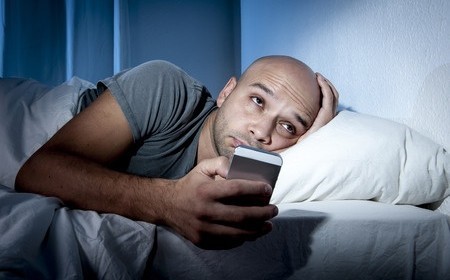Is addiction to Social Media leading to Insomnia in our generation?

Our generation is in denial about this particular subject. Does our addiction to Social Media and Technology lead to insomnia and affect our health?
Jane introduces her 2 guests, Dr. S. Mohanraj, a Consultant Psychiatrist, and Pradeep, who runs a Social Media Marketing frim.
It is quickly established that a social media addiction could cause insomnia because When you stare into the screen, your eyes adjust to the screen light after which even if you want to sleep, you cannot, and this leads to insomnia.
A Second adverse effect of Social Media addiction is on the relationships that people have, as it decreases real physical and social interactions, and people isolate themselves in real life.
Pradeep is of the opinion that it’s unfair to blame social media as it is a tool designed to communicate, not cause insomnia.
Jane points out that Social Media Marketing itself is aimed at pushing your content and though you can turn of the TV, you cant turn of Social Media.
Pradeep responds that TV is just as much to blame as social media. People are generally curious by nature and want to always be aware of what’s happening in the world around them and Social Media is a real-time update of that.
Dr. Mohanraj agrees. He says that Social Media is not the only reason insomnia is on the rise, but just one of the newer reasons. A lot of students stay up all night on Social Media, or gaming all night n sleep through the day skipping college, while others find themselves unproductive through the day. That kids spend up to 16-17 hours online or gaming a day.
His advice to these people is to limit social media to desktops or laptops, and keep it off their mobile phones. He also says that Social Media has good uses too and good trends that come up because of it. It is a tool that can be good or degenerative.
Pradeep points out that even those who go off the grid for a couple of days but come back more addicted than before. Social Media is programmed to make you want to use it. He says that the problem is that people are plugged into their online lives and reality at the same time, there’s some white noise in between. If Social Media is in the back of your mind even when you’re not on it and you’re not able to tune out of it and tune into reality, that’s a real problem.
At this point they acknowledge the uniting quality of social media with the kind of solidarity and support pouring in from across the world during violent incidences such as the Australia hostage situation, the Peshawar attack and most recently, the Paris terrorist attack.
On the negative side, it would seem that Virtual reality has taken over reality.
Pradeep acknowledges that although brands on facebook are eager to force loads of content on users, it is up to Social Media agencies like his to remind them that they are trying to build relationships and are not just doing one way marketing here.
A caller also highlights the latest health condition called “Text-Neck” that’s a result of youngsters constantly looking down at their phones, therefore straining their necks.
Pradeep jokes that soon this won’t be a problem if gadgets like Google Glasses get popular.
Dr. Mohanraj still insists that Social Media must be used responsibly and that at some point of the evening or before bed, we must turn off wifi or our phones and ensure we get 7-8 hours of sleep at the very least. Facebook does not control us, and there is a real life outside.
Pradeep highlights a useful tool on smartphones where you can put yourself on a “do not disturb” or DND mode, where only a small list of people would be able to reach you. This might be handy for people trying to disconnect after a long day as it gives you more control on who reaches you and what you see even on Social Media updates.
There are youngsters who have thousands of friends on facebook but no friends in real life, and therefore are extremely uncomfortable with social interactions.
In conclusion they all agreed that Social Media is a great tool to connect with real friends, even those across the globe. There is a thin line between the good and the bad. We should know where that line is, and know when to tune out. We must disconnect and concentrate on our offline lives as that is what is real. We must know our limits and take control of our virtual lives.
